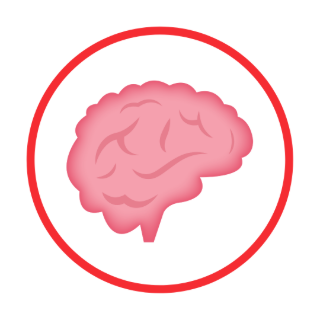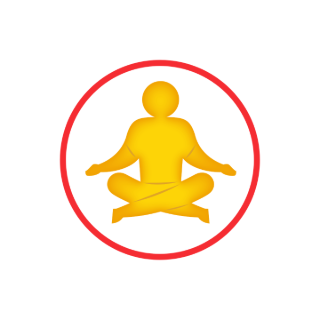How to Be Happy With What You Have
Nov 6, 2024
By Will Moore
Have you ever found yourself staring at your phone, thumb hovering over the "delete Instagram" button? Despite having a good job, comfortable home, and active social life – things that "should" make you happy – each scroll through your feed leaves you feeling increasingly unhappy and dissatisfied with your life.
I hear you thinking, "I have more than most people could dream of. So why do I feel like I'm always falling short?"
You're not alone in this struggle. In fact, research from the Harvard Business Review reveals people feeling inadequate after scrolling social media, despite having objectively good lives. We're caught in an endless comparison cycle, chasing an ever-moving target of "enough."
But here's what's fascinating: Studies show that people who report the highest levels of contentment share something surprising in common—and it's not what they have—it's how they think about what they have.
The truth is that learning how to be happy with what you have isn't about lowering your ambitions or settling for less. It's about fundamentally changing how you approach what "more" means. Let's explore how to make that shift in a way that's both practical and profound.
In this science-based guide, you'll discover:
Why traditional advice about "just being grateful" often backfires, and what research shows actually works for living a contented life
A comprehensive framework for building genuine happiness across the five key areas of life that matter most
Simple, personalized strategies to transform your relationship with what you have backed by behavioral science and proven principles
The Comparison Trap: Why Having More Doesn't Equal Happiness
I used to think happiness was a destination. Get a better job, buy a bigger house, achieve the perfect body – then I'd finally be content. Maybe you've fallen into this same trap, constantly pushing the goalposts of "enough" further away.
The reality changed everything for me: Research from Yale University's "Science of Well-Being" course reveals a fascinating phenomenon called "miswanting" – our tendency to incorrectly predict what will make us happy. We chase external circumstances, believing they'll bring lasting fulfillment, only to find ourselves still searching once we achieve them.
The Science of Never Enough
Three key factors keep us stuck in the comparison trap:
The Hedonic Treadmill: You achieve the promotion you've been dreaming of, which brings a brief spike in happiness. Yet, within weeks, you return to your baseline, already eyeing the next level.
Social Media's Highlight Reel plays a powerful role. Most people share only their peak moments, leading you to compare your regular daily life with others' best 1%, creating an impossible standard of constant perfection.
The Scarcity Mindset focuses on what's missing rather than what’s present, keeping you in a perpetual state of lack. This mindset can prevent you from fully appreciating your current success, regardless of your actual circumstances.
Read More: Money Doesn't Buy Happiness
The Missing Piece
Decades of research in positive psychology have revealed that lasting happiness isn't about accumulating more—it's about growing in the right areas of life. The truly satisfied individuals I've studied don't just focus on material gains. Instead, they cultivate fulfillment across five fundamental life dimensions that matter most for genuine contentment.
The good news? Once you understand these five core areas and how to nurture them, you can break free from the comparison trap and live contented life regardless of what others have or don't have.
Let's explore each of these core areas and discover how they work together to create genuine contentment that doesn't depend on keeping up with the Joneses.
The 5 Core Areas of True Contentment

1. Mindset Core: Shifting from Comparison to Appreciation
Think of your mindset as the lens through which you view your entire world. When that lens is clouded by constant comparison, even the most beautiful life can appear dull and insufficient.
Recent neuroscience research reveals something fascinating: Your brain can't simultaneously process gratitude and anxiety about what you lack. It's physically impossible. This means developing the growth mindset isn't just about "positive thinking" – it's about literally rewiring your neural pathways to experience more contentment.
The Science of a Content Mind
A groundbreaking study from UC Berkeley found that people who regularly practice gratitude:
Experience 23% lower levels of stress hormones
Report 31% higher levels of daily happiness
Show significantly lower rates of comparison-based anxiety
But here's what most gratitude advice gets wrong: Simply trying to "be more grateful" usually backfires. True appreciation requires a systematic approach that works with your brain's natural tendencies, not against them. You should check our free to download Gratitude List to shift your mindset and unlock positivity in life.
Success Habit to Build: Practicing Gratitude
Instead of fighting your natural tendency to compare, use it as a trigger for appreciation. Here's how:
Notice comparison triggers, e.g., social media scrolls, promotions for colleagues, or vacation photos of friends.
Transform your triggers by asking, "What does this reveal about what I value?" Identify, "What do I already have in this area?" Then focus, "How can I appreciate what's present now?" This shift helps ground you in gratitude and clarity.
Read More: Why Gratitude is Important
To make this shift stick, we need to make it obvious, easy, and rewarding. Here's a science-backed method that works for real:
Make it Obvious
Rename your most-used apps to gratitude prompts (e.g., “Pause & Appreciate” for social media). This serves as an obvious reminder to shift your mindset to gratitude before engaging in potentially comparison-inducing activities, creating a visible, consistent cue.
Make it Easy
Each time you catch yourself comparing, shift focus to one positive aspect of your life. Be it your health, having a like-minded friend, or anything. This simple, low-effort action keeps gratitude accessible. It helps make appreciation an easy, go-to response without needing extra time or energy.
Make it Fun and Rewarding
Turn gratitude into a game by challenging yourself to identify three unique things you’re grateful for each day. Once you complete a week, reward yourself with something small, like a treat or relaxing activity. Gamification adds an element of fun and makes each day’s challenge feel like a positive achievement.
Make it Automatic
Set up a recurring daily reminder on your phone at a consistent time, such as bedtime or during lunch, to reflect on three things you will appreciate. This pre-scheduled cue helps embed gratitude into your routine without extra effort, making it an automatic part of your day.
Learn More: How to Change the Way You Think

2. Career & Finances Core: Finding Purpose Beyond Possessions
Let's address the elephant in the room: Yes, money matters for happiness – but not in the way most people think. Research found that once you earn enough to meet basic needs (about $75,000 annually in the US), additional income has virtually no impact on daily happiness.
Yet we often fall into the trap of thinking our next raise, promotion, or big purchase will finally make us content. I've watched countless colleagues achieve their "dream" salary only to find themselves just as unhappy as before, just with nicer stuff. Many people struggle with spending habits that don't align with their values. The key is to develop what some call the millionaire mindset - focusing on value creation and purpose rather than just accumulation.
Success Habit to Build: Purpose-Driven Career Planning
Instead of chasing titles or salaries, try this research-backed approach:
Map your meaning by listing activities that make you lose track of time, identifying problems you genuinely enjoy solving, and noting when you feel most energized at work.
Align your actions by seeking projects that play to your strengths, volunteering for responsibilities that excite you, and creating opportunities to use your natural talents.
Redefine "Rich" by calculating your personal "enough" number, identifying non-financial forms of wealth, and planning your spending around what truly matters to you.
Here's how to make this shift sustainable:
Make it Obvious Write down a short, powerful purpose statement and place it where you’ll see it daily—on your desk, mirror, or phone lock screen. Let this reminder ground you every day in what truly matters and why you do what you do.
If you are uncertain about your passion and purpose, read this guide: How to find your Ikigai
Make it Easy Break your big purpose into one small, manageable action each day. For instance, if your purpose involves making more money by solving big problems, dedicate five minutes each morning to research a new project or skill related to that goal. The smaller the step, the easier it is to keep momentum going.
Make it Rewarding Track the real-world impact of your purpose-driven work by keeping a journal or digital note where you log contributions, like positive feedback or project milestones. Celebrate each step forward by rewarding yourself with something meaningful, like taking a break or enjoying a treat, to acknowledge your progress.
Make it Automatic Set quarterly calendar reminders to revisit your purpose statement and career goals. Use this time to reflect on what’s working, adjust as needed, and keep aligned with what truly drives you.
When you're clear on what truly matters to you, it becomes easier to be happy with what you have while still working toward meaningful goals. Think of it like a GPS: Without knowing your destination, no amount of speed will get you where you want to go.
Read More: How You Can Achieve Success with the Habits of Self Made Millionaires

3. Relationships Core: Cultivating Genuine Connections
Here's a striking paradox of our time: We're more connected than ever through social media, yet studies show loneliness and social isolation are at record highs. The same platforms that promise to bring us together often leave us feeling more alone and dissatisfied with our own relationships.
A landmark Harvard study spanning 80+ years revealed something profound: The quality of our relationships is the single strongest predictor of happiness and longevity.
Success Habit to Build: Deep Listening Practice
One of the most important skills in deepening relationships is being a better listener. The antidote to shallow connection is what psychologists call "active presence." Here's how to develop it:
The 80/20 Rule of Connection – Listen 80% of the time, talk only 20%, and focus fully on understanding rather than preparing a response.
Quality Time Rituals – Schedule regular, distraction-free conversations, create dedicated spaces for deep connection, and prioritize face-to-face interactions whenever possible.
Vulnerability Practice – Share genuine thoughts and feelings, admit when you're struggling, and ask for help when needed.
Here's how to make this habit stick with these science-backed strategies:
Make it Obvious Designate certain areas in your home as phone-free zones, like the dining room or living room, where you can focus on being fully present with family or friends.
Make it Easy Keep a list of simple, meaningful questions like “What was the best part of your day?” or “What’s something you’re grateful for today?” This makes staying connected simpler and keeps the focus on shared experiences.
Make it Rewarding Keep a “Connection Journal” where you jot down memorable interactions or things you appreciate about the people around you. Reflecting on these moments will help you feel satisfied and recognize the little things that bring joy to your relationships.
Make it Automatic Set weekly or monthly reminders to reach out to important people in your life.

Remember, the goal isn't to have the biggest social network or the most impressive-looking social life. It's about creating meaningful connections that enrich your daily experience and support your growth.
4. Physical Health Core: Appreciating Your Body's Journey
In a world of filtered fitness influencers and "perfect" body images, it's easy to forget that your body's primary purpose isn't to look good in photos – it's to help you experience and enjoy your life. Yet many of us spend countless hours and endless energy comparing our bodies to unrealistic standards, creating a cycle of stress and dissatisfaction.
Success Habit to Build: Mindful Movement Practice
Instead of exercising to change how your body looks, try this evidence-based approach:
Energy Mapping: Track your natural energy patterns, identify activities that energize you, and notice which movements bring you joy.
Sensation Focus: Pay attention to how your body feels and observe daily improvements in function.
Intuitive Movement: Choose activities you genuinely enjoy, listen to your body’s needs, and adjust intensity based on your energy levels.
To get consistent:
Make it Obvious Place your workout clothes, sneakers, or a yoga mat in plain sight. This simple step serves as a constant visual reminder to move, making it easy to grab and go when it’s time to get active.
Make it Easy Begin with just five minutes of movement each day, whether it’s stretching, walking, or a quick workout. This minimal time commitment makes it easy to get started and builds momentum for longer sessions.
Make it Fun Put on a song you love and dance freely. This simple, enjoyable activity turns movement into something you look forward to, helping you feel good.
Make it Automatic Schedule a daily reminder or alarm on your phone to prompt you to move at the same time each day, such as mid-morning or after lunch. This automated cue gradually establishes a routine, making movement a natural and consistent part of your day.
Read More on Habit Formation: Crush Bad Habits Forever Using Cue-Craving-Response-Reward Technique
The Energy Advantage
When you shift focus from appearance to energy, something remarkable happens:
You naturally make better food choices
Your movement becomes more consistent
You experience more physical confidence
Your body image improves without forcing it
Remember, your body is an instrument, not an ornament. Its value lies in what it helps you do and experience, not how it looks in comparison to others.
Learn More: How to Get Back on Track with Diet

5. Emotional & Mental Health Core: Finding Inner Peace
In our hyper-connected world, it's easy to mistake emotional stability for weakness and inner peace for complacency. We're constantly bombarded with messages suggesting that being satisfied means settling, that contentment equals giving up on growth.
However, people with the highest levels of emotional well-being aren't those who never struggle, but those who've developed a resilient relationship with their inner world.
Studies show three key differences between people who maintain contentment despite life's challenges. Their findings indicated that individuals who reported higher contentment were more satisfied with life, exhibited greater self-acceptance and purpose, and enjoyed better relationships and environmental control, even when considering their other positive emotions.
Success Habit to Build: Daily Mindfulness Practice
Instead of fighting negative emotions or forcing positivity, try this evidence-based approach:
Utilize the RAIN Method. Recognize what you're feeling, Allow it to be there, Investigate with kindness, and Nurture with self-compassion.
Schedule brief pause points throughout your day, reflect on your emotional state, and notice patterns without trying to change them.
Acknowledge where you are now, appreciate your progress, and set intentions without attachment.
To make this habit stick:
Make it Obvious Designate a calming area in your home where you can practice mindfulness daily, even if it’s just a small corner with a comfortable chair or cushion. This dedicated space serves as a constant reminder to check in with yourself and encourages a regular mindfulness routine.
Make it Easy Start with just three minutes of meditation or focused breathing each day. This small, manageable amount of time removes the pressure and makes it simple to integrate mindfulness into your life.
Make it Rewarding Keep a journal or digital note where you record moments of emotional resilience, like handling a stressful situation calmly or noticing a pattern without judgment. Celebrate these “resilience wins” regularly as they help reinforce the progress you’re making in your emotional well-being.
Make it Automatic Pair mindfulness check-ins with routines you already follow, such as drinking your morning coffee, brushing your teeth, or commuting. For example, take three mindful breaths each time you sit down at your desk. Linking mindfulness to these regular activities makes it an effortless, automatic part of your day without the need for reminders.
For more tips, check out: How to Clear Your Mind for Meditation

The Inner Peace Paradox
Here's what's remarkable about developing emotional strength: When you stop fighting your inner experience, you naturally:
Feel more in control of your responses
Experience greater clarity in decision-making
Build deeper connections with others
Find contentment independent of circumstances
Learn More: Habits of Happy People
Personalizing Your Path to Contentment
Understanding these five core areas is just the beginning. The real magic happens when you personalize this framework to your unique life circumstances, preferences, and goals.
Using AI to Create Your Contentment Blueprint
Start by gathering your personal factors:
Lifestyle Factors
Daily routines and schedules
Living situation and environment
Current commitments and responsibilities
Personal Strengths
Natural talents and abilities
Developed skills
Character traits that serve you well
What matters most to you
Non-negotiable principles
Sources of genuine joy
Use this template to create your personalized contentment strategy:
"I want to develop [HABIT] because it aligns with my [STRENGTH/VALUE]. Considering my [LIFESTYLE FACTOR], I can make this easier by [STRATEGY]."
Example: "I want to develop a morning gratitude practice because it aligns with my value of mindful living. Considering my early morning schedule, I can make this easier by combining it with my existing coffee routine."
Conclusion: Your Journey to Lasting Happiness
Learning how to be happy with what you have isn't about settling – it's about developing a richer, more nuanced relationship with your life as it unfolds. By nurturing these five core areas, you create a foundation for genuine contentment that doesn't depend on comparison or external validation.
Read More: How to Find Joy in Life Again
Remember:
True happiness comes from balance across all cores
Small, consistent actions create lasting change
Personal growth and contentment can coexist
Ready to Transform Your Relationship with Happiness?
If you're ready to take these concepts from theory to practice, the Moore Momentum System offers a comprehensive, science-backed approach to building lasting contentment.
This innovative system combines:
AI-powered personalization
Research-based strategies
Community support
Continuous growth tracking
Start your journey today:
Take our free Core Values Quiz to identify your areas of improvement
Our Mission: Accelerate your growth in the 5 Key areas of life by making your habit transformation journey so simple, fun, and rewarding that your momentum becomes inevitable.
Ready to discover genuine contentment while still pursuing growth? Take the first step now.
